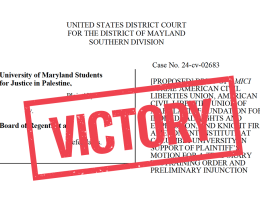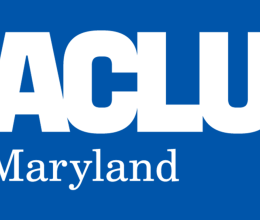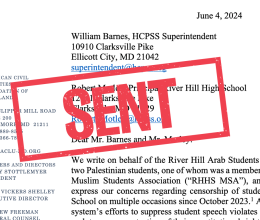
MEDIA RELEASE
ACLU Says Division of Corrections' Revised Social Media Policy Remains Coercive and Violates "Friends" Privacy Rights
FOR IMMEDIATE RELEASE
April 18, 2011
CONTACT: Meredith Curtis, ACLU of Maryland, 410-889-8555; media@aclu-md.org
BALTIMORE - Concerned that the Maryland Division of Corrections' revised social media policy violates the privacy rights of third party "friends" and is not truly voluntary, the American Civil Liberties Union of Maryland has sent a letter to Public Safety Secretary Gary Maynard asking for a meeting to discuss the policy. In addition, the ACLU is announcing plans to contact Facebook's policy director and Maryland AFSCME to invite their inclusion in discussions about the policy, given the policy's effects on the members of each.
"While we appreciate the DOC's willingness to reassess this policy, we think the revisions made thus far do little to address the threats the policy poses to privacy rights of social media users, due to the inherent coerciveness of the job certification process and the policy's intrusion upon the privacy rights of third parties," said Deborah Jeon, Legal Director for the ACLU of Maryland. "Given the privacy issues at stake, and the worrisome national precedent being set by the Maryland policy, we hope Secretary Maynard will take us up on our offer to meet to further discuss these issue with all interested parties."
On January 25, the ACLU sent a letter to Secretary Maynard detailing the experience of Officer Robert Collins, who was ordered to supply his Facebook login information during a recertification interview - giving the DOC access to his private electronic communications, and leaving his friends vulnerable to governmental cyber-snooping. The ACLU asked DOC to rescind its blanket policy demanding personal social media passwords from corrections officers and applicants as part of the employment certification process. Following a public outcry, the DOC announced a suspension of the policy for 45 days to provide time for review and investigation of the experience of job applicants.
On April 6, Secretary Maynard sent a letter to the ACLU partially describing DOC's revised policy. The letter states that under the new policy candidates for jobs and recertification have to sign a form saying that they understand it is "voluntary" for them to provide access to their social media accounts during interviews. Although not mentioned in the letter to ACLU, in statements to the media the DOC described other revisions in which candidates would log on to their social media accounts during the interview, to look at along with interviewers, rather than give DOC their login and password information. Such a process, if this description is accurate, does little to ameliorate the policy's coercive nature.
One DOC press statement indicates that of 80 employees hired by the DOC since the social media inquiry policy took effect, only five did not or could not provide the DOC with their social media passwords. While it is unclear from the DOC's choice of wording if even a single applicant actually refused the request (as opposed to being unable to recall their password, or perhaps not a user of social media), even in the unlikely event that all five had refused outright, that would still mean 94 percent of applicants did provide their information - a rate that flies in the face of the DOC claim that the process is not coercive, given general public objections to this policy.
Most importantly, no information has been offered about what percentage of those 2,619 applicants not hired by the DOC refused the requests. That information is vital in any attempt to demonstrate that no applicants were penalized for refusing to provide their passwords. Moreover, if the policy is truly voluntary, and if it is true that no negative inferences will be drawn, then it serves no useful purpose.
In addition, there remains unaddressed the serious issue of privacy violations of the "friends" of applicants. These third parties are offered no opportunity to object to the government's intrusion, yet their private electronic correspondence with the applicant, their photographs and postings will be exposed to government scrutiny, just as are the applicant's communications. The ACLU believes this violates their privacy and cannot be allowed.
Said Officer Collins, who is represented by the ACLU: "It concerns me that the Division of Corrections has not yet abandoned this policy, especially because it infringes on the rights of social media ‘friends.' Some people trying to consolidate communications in their lives now have bank statements, bills, car notes, mortgage notices, credit card statements and other correspondence sent to Facebook email, rather than to a traditional email account, or though snail mail. It is totally inappropriate for the government to access such personal information regarding not only the prospective employee, but also that of their friends and family."
###





